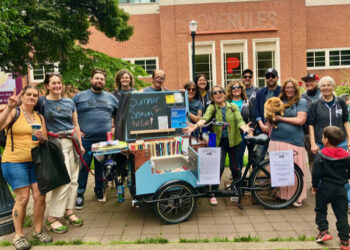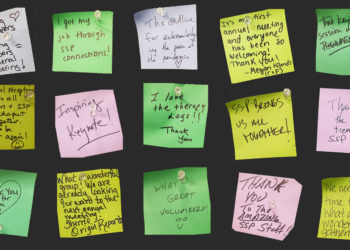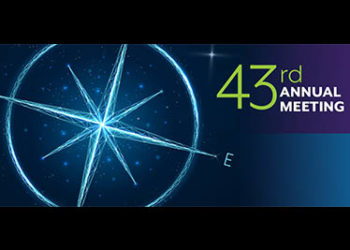Editor’s Note: Today’s post is by Stephanie Lovegrove Hansen. Stephanie is VP of Marketing at Silverchair and a member of the SSP Marketing and Annual Meeting Program Committee.
The 2023 SSP Annual Meeting in Portland, Oregon is just around the corner (kicking off on May 31st)! As our calendars start to fill up with meetings, sessions, and sightseeing adventures during that week, Stephanie Lovegrove Hansen sat down with the Co-Chairs of the Annual Meeting Program Committee to learn more about the event and what we can look forward to.
- Emily Farrell, Director of Open Research for the Americas, Taylor & Francis
- Lori Carlin, Chief Commercial Officer, Delta Think
- Tim Lloyd, Founder & CEO, LibLynx
What’s one thing about the 2023 Annual Meeting that you are most looking forward to?
Emily Farrell: I’ve been involved in shepherding the poster sessions, and I’m pretty excited about that as a space this year. It’s only the second year that we’ve done a poster session at SSP, and it’s really a space where people can interact and engage with the presenters and with these topics in a much more detailed way than you get a chance to even in the Q&A after a standard session. So I’m really excited to go and engage with people and dig into the topics. It’s a great place to meet people, too, and in a more guided way. So if you’re new to the conference, you can go and introduce yourself and get to know some of the topics and some of the people.
Lori Carlin: There’s so many things about each year’s annual meeting that makes each one unique — certainly location, since we’re on the West Coast this year. That’s exciting. Last year was our first in-person meeting as we were emerging from the pandemic, and this year feels even more back to “normal” in our meeting schedules. So I’m looking forward to seeing people in person again and being able to mingle and interact. We also have a very wide breadth of content in this year’s program and we’re very excited to deliver that to the attendees.
Tim Lloyd: What I’m most looking forward to is the opening keynote with Elisabeth Bik. Integrity is a critical issue for our industry, most recently underscored by the news from Wiley with the concerns over Hindawi’s special issue journals. Elisabeth is one of the industry’s foremost and respected leaders in the area of research integrity and I’m really looking forward to hearing what she has to say.
Many things to look forward to! As Lori was alluding to, every meeting has its own flavor, based on where it is, the content, etc. —what’s something that makes this annual meeting unique for each of you?
LC: We’ve got a few sessions this year that are different from what we’ve done in the past. One of those is going to be our second plenary session on Thursday morning. Rather than having a single speaker, we’re going to have a panel of thought leaders from a diverse group of organizations within our industry looking at the issues facing us currently and into the future and discussing how organizations can begin to address those issues. We think this is going to be a very engaging and vital session. These are not planned talks — it’s more of a fireside chat, and we’re really looking forward to introducing that type of a plenary session to the meeting this year.
EF: Connected to what Tim said about Elisabeth Bik’s keynote, I think that what’s somewhat unique is really the point in time that we’re in. There’s a real need for discussions around research integrity and how important it is for us to come together as experts in scholarly communication to talk about these topics. I think that these are challenges that we’re all facing and that we need to face together as a community. As Lori said, we’re still getting back to conferences, and for a lot of people at SSP’s annual conference last year, it was the first conference that they’d been back to in person. I think talking about these topics of integrity, trust, transparency, and so forth really does require us all coming together and being able to do that in person is where we start to try to solve these problems or look at potential solutions.
TL: Although we didn’t plan this in advance, that’s the perfect lead-in to the point I was going to make, Emily! Which is that one of the other changes this year is that our closing plenary is going to be a moderated debate. I think that now, more than ever, we need to come together as a community and debate some of these pressing issues that we’re facing as a community and as an industry, and do it in a respectful but meaningful and significant way. The moderated Oxford-style debate that will happen Friday afternoon will be a wonderful experience for that. I think everyone will find it very exciting. As an Oxford-style debate. we’ll poll the audience in advance about how they feel about the issues / the proposition, then we’ll poll them again at the end. We’ll have two teams debating it, we’ll have a really good proposition for you based around trust and integrity and I think it’s going to be a great and exciting way to wrap up the conference.
SLH: I’m really looking forward to that! As you said, the theme is, “Transformation, Trust, and Transparency” — how has this theme shown up in the event, either in the planning, the content, or other aspects of the annual meeting?
LC: For all of the session proposals that we looked at, we tried to make sure there was a theme of research integrity running through the conference. As you know from being on the committee, Stephanie, this theme was chosen back in September. So it was absolutely bubbling up as an issue for our industry over the last year, and it’s really risen to the forefront of publishers’ minds as what they need to focus on. But it’s had an explosion over the last couple of months — ChatGPT certainly brought it to the forefront — and it’s on everybody’s minds now, not just in our industry, but as a global issue that folks are facing. Looking at how to best utilize it, where the pitfalls may be — this is a technology that we need to embrace and understand, so we’re hopeful that the conference will really look at all different types of transformations, trust, and transparency and ways that folks can both embrace and resolve issues with these concepts.
EF: We had such an incredible array of submissions across topics that connect to the conference theme, so I think we’ve come to a program that really does balance all sorts of topics that connect to that. One in particular for me, from where I sit in my day job, are the topics around Open Access and open research. We’ve also seen the OSTP memo since the last annual meeting, and the NIH data sharing policy came into effect at the end of January. So not only the broader shift toward open, but also the way it’s being supported through policy has been really interesting to watch in the last year. So I know that there are places in the program where we’ll see people actively make those connections between the shift to open, the challenges related to that transformation, and other sorts of threads and connections.
TL: We also tried to represent the conference themes in as broad a way as possible, so in addition to things like the OSTP memo, we’ve got sessions on building trust with underrepresented groups, the role of trust in publishing for sustainable development, as well as several sessions specifically about preserving the integrity of the scholarly record and research integrity in general. So we’ve really tried to see the theme in a very holistic way in terms of how it affects our industry.
SLH: One thing I enjoyed from being on the committee and seeing how all this comes together is that the theme came up in the ways we even reviewed the sessions: Are we being transparent? Are we gaining the trust of the people who are making the submissions? So it’s cool to see how it comes into play in every step of the way as the meeting comes together.
The meeting is in Portland this year, which I personally have never been to and am very much excited to visit —I have a long list already of things to do! Obviously the meeting is the big highlight, but outside of the walls of the conference hotel, is there anything you’re particularly excited about—food, activities, or other sightseeing things in Portland?
TL: I’ve never been to Portland either, so it’s new for me! I did some research, and the two things that stood out to me are food and arts. I love trying all sorts of types of food. It sounds like food trucks are a big part of the city’s culture, which is very exciting for me. Portland describes itself as a hub for artists, entrepreneurs, and creators. There’s a big crafting movement, so I’m very excited to just wander around the shops and see what sort of crafty stuff there is. Finally, I love the idea that it’s a city accessible by bike. If I have time, I’d love to just cycle around it.
EF: I spent a short stint living in Portland a long time ago and I can confirm that it’s a fabulous city to bike around. I know everybody knows it, but it’s hard to get past how incredible Powell’s is as an amazing place to get lost in books. As a bunch of people who are dedicated to knowledge, and I know quite a few people attending the conferences are avid readers, I imagine we’ll all be bumping into each other in the aisles. I also love having a conference in a city where you can get up for a morning run — the path along the river is really lovely, so anyone who’s up for a slow run along the river in the morning, I always like some company!
LC: I completely agree with Tim and Emily — all of those things sound lovely. I live in a town on Long Island, and we had a fabulous bookstore that closed during the pandemic after about 40 years, so I am really excited to go to Powell’s, because I miss that experience. I also have never been to Portland but it has always been on my list of places I wanted to visit, because of the arts, because of the food, because of all these things, but I’ll add two things to that list: Oregon pinot noir (big fan) and Voodoo Donuts! We’re really looking forward to experiencing Portland in addition to the SSP conference.
Thank you all for giving us these little previews and tastes! Hopefully it inspires even more of our friends and colleagues to join us — see you in Portland!
Register here to join us at the meeting, either virtually or in person! And remember that attendees are invited to bring paperback books to donate to Street Books, a non-profit mobile library that serves people who live outside in Portland.
Discussion
1 Thought on "Ask the Co-Chairs: A Look at the 2023 SSP Annual Meeting"
Looking forward to seeing you all! And Lori, I love the Book Revue shout-out. They were a Long Island treasure & much missed.



